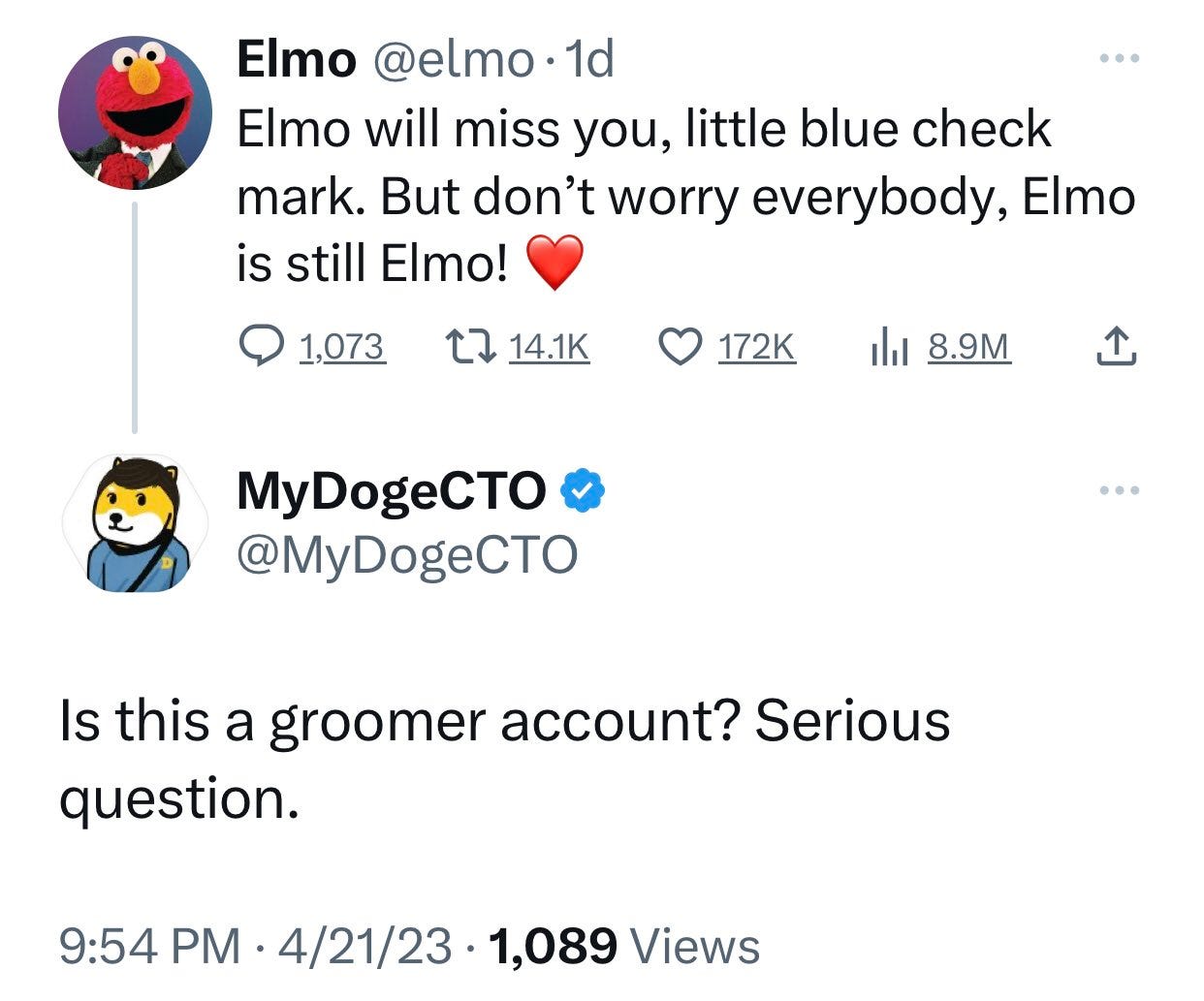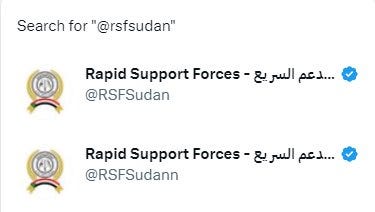Checked Out
The revolution will be livetweeted
The latest drama on Twitter is not about some subject in particular, but about the site itself: on April 20th (4/201, by the date system only Americans use), everyone who doesn’t pony up 8 dollars a month lost their “blue check” (or checkmark), a blue sign next to their name indicating verification.
A few months ago, anyone who subscribed to Twitter Blue (a premium version of Twitter) also obtained a blue check as part of their subscription, leading to widespread mockery. In the latest installment, a bunch of celebrities complained about not being verified anymore and left the site, and then Twtiter owner Elon Musk personally paid the 8 bucks to “troll” some of the people complaining (such as Paul Krugman), and later reinstated it for anyone with over a million followers. And now it’s against Twitter rules to make fun of “blue checks”, and an account advocating banning all of them got suspended.
Okay, so what the hell is going on?
Do celebrities dream of Twitter clout?
Mr “Cat Turd”, a major right wing account, Jiang Zemin lookalike, and frequent Elon Musk interlocutor, is asking why celebrities are too cheap to pay for a blue check. Interesting question indeed: why are celebrities not paying 8 dollars for Twitter Blue verification? In fact, many (such as, I think most memorably and in-character, Jason Alexander) annnounced they were leaving the site altoghether. What gives?
Fundamentally, I think, a celebrity who’s on social media has to balance getting engagement from their (large) audience, for example for endorsement deals, and the risks to their reputation - being associated with problematic opinions, porn, or scams. There’s also just plain abuse or harassment - Millie Bobby Brown quit most social media because people kept using her pictures for homophobic memes, and basically anyone who was in the last Star Wars movies and wasn’t a white man got infinite death threats.
“Having haters” is pretty much unavoidable, justified or not, but the benefits of engaging with a large audience versus the risks of getting cancelled present some real trade-offs: just ask Gina Carano, who lost a contract for infinite money with Disney’s The Mandalorian because she couldn’t stop comparing COVID measures to the Holocaust, or being transphobic, or supporting January 6th on Twitter2. The risk of people using your identity to scam others is especially high for celebrities (ask Taylor Swift, of “unregulated securities” fame): some high-profile individuals might do giveaways to their followers; imitating their style but linking to some shady side to steal every penny to a fan’s name is real.
The blue check is a form of signal, a piece of information that reveals what kind of person someone is. Normally, the kinds of people (called “types”) depend on how much someone is willing to pay for something. In this case, the types are normal users, and important people. What Twitter has always tried to do is sell each type a bundle of features, such that they want to both stay on the site, and also use it according to their type. Twitter gave some people checks for the same reason museums give old people discounts: to get them to both go, and also to choose the bundle that best suits their type.
The first condition (wanting to be on the site), known as participation, is pretty simple: both important people and normies want to have to be on Twitter, especially because it prides itself in being a hub for all of the world’s thought leaders or whatever other nauseating name there is for them. To satisfy participation, getting either bundle of features has to be good enough for everyone - so going there has to be worth it for normal people and the Twitter elite if they get either set of features. Hence celebrities abandoning Twitter when the checks got taken away - it was just not beneficial enough to justify the costs of an impersonator who paid 8 bucks ripping off your fans or making you look racist. The actual value of being verified, for celebrities, comes from knowing it's the real Adam Sandler and not some guy pretending to be him, and paying for Blue lets you post longer tweets but doesn't actually verify that it’s Adam Sandler at all. So unless you want the bonus features, why pay?
The second condition, known as incentive compatibility, is trickier: people also have to want to have the features that are best suited for their type. You want people who want to post long tweets to pay for Twitter Blue, and for everyone else to not want to pay and instead generate revenue some other way. It’s why the ad-free version of something costs money, or why premium dating sites charge subscriptions. Twitter nailed this in the pre-Musk era (b.E., before Elon), because you got the same site experience with or without the checkmark, but people who were somewhat relevant got the safety of others knowing it really is Nikki Minaj saying her cousin has swollen testicles from the COVID vaccine. But now, people who should want a blue check don’t want one, because there’s no compatibility - they don’t actually get verified, just a little sign and the ability to edit their tweets. Weirdly, divorced of the faux-populism and Twitter class resentment, it would make sense to create a version of Twitter that is aimed at power users, with longer tweets, longer videos, formatting, and editing. A few people I know like the features, or just want to contribute to Twitter, so they pay.
But fundamentally, if paying doesn’t even verify you, then it’s too risky to be on Twitter as a celebrity, and there’s no incentive to pay because it doesn’t actually give you the bundle of services you want. So you’re not on Twitter at all (most celebrities), or you just give up on verification and hope for the best (journalists, intellectuals). There’s also this kind of stuff:
Infinity Pool
There’s another problem: of the people who actually do use Twitter for more than plugging their latest film (or getting Andrea Riseborough an “illegal” Oscar nomination in some weird form of affirmative action for white people), nobody wants a blue check. They’re all explicitly going out of their way to point out they didn’t pay for it. This goes beyond incentive compatibility, then.
When people have to provide signals, there’s two scenarios that are normally studied: one where everyone gives the same information, or one where everyone gives accurate information. The first, called the pooling equilibrium, is why all men state their height as 6’0 in their dating profiles: it’s understood women want men who are tall, and the official designation of tall is 6’0 (or 180cm in normal countries), so everyone says at least that. The second, called the separating equilibrium, has everyone provide their type, so for example why people specify their sexuality and interests on dating sites - otherwise lesbians would get flooded with straight girls.
There’s no inherent morality or efficiency here: Rwanda used to make people have their ethnicity in their ID, but stopped because the government used that information to attempt a genocide on the Tutsi minority. But back when Denmark was occupied by the Nazis, a lot of people (including the King) wore Stars of David that Jews were mandated to wear so that it was impossible to distinguish them. It cuts both ways. Pooling can be bad or inefficient, and separating can be bad or inefficient.
As said before, a check was a signal - originally, one that you were important. The allocation mechanism was arbitrary and often criticized, but in general it separated the “important” from the “unimportant”. Making blue checks available to anyone who paid for it, and the notice not distinguishing who did which, was moving to a pooling equilibrium - pooling the important with the payers. This isn’t unique: education does this all the time. Attending a prestigious college comes from the fact that you’re either very smart, or very rich and well-connected, and the whole point of not being 100% meritocratic is that the second group is pooled with the first one - is Brayden Getty a Harvard grad because he’s smart, or because his family gave Harvard a million bucks?
The problem comes from the fact that the people paying for Blue, and the check, aren’t random people who want to be seen as prestigious. It’s people who are ride-or-die for Elon Musk, and everyone else tends to find them very annoying (if not toxic or bigoted or anything else). So suddenly it’s not “normies getting blended in with the oi palloi” it’s “the hoi palloi getting blended in with the Musk Machos”, and the latter group is roundly disliked, so it’s not a good signal. You’re not stuck in there with legacy checkmarks, legacy checkmars are stuck in there with you.
Who’d want to be part of this crowd?

Conclusion
There’s three options for verifications:
nobody has verification, and important people don’t bother much because anyone can claim to be them and scam people or post offensive things
only important people get verified, and you have a functional-ish but capricious and arbitrary system of who’s important and who isn’t
anyone can get verified, so important people still can’t really prevent themselves from being used for scams/racism, plus they’re grouped in with whoever else gets verified and their own inclinations.
Trying to get Adam Sandler and basedpepe1488 to be in the same tier of verification, either way, is just not conducive to Mr Uncut Gems being on the platform much. I do think the old system was kind of unfair, but it mostly reflected, rather than created, status - people who were considered high status IRL (offline) got verified because of their status, so that they’d engage. Perhaps a system where anyone can earn their check due to either online or offline notoriety is good? Substack verifies anyone with over a certain number of subscribers, and they might also verify IRL notorious people (there’s someone claiming to be Woody Allen, for instance). That could work.
Fundamentally, I think the issue is that Elon Musk, paraphrasing John Ganz, “traded his car dealership for Twitter clout” - a car dealership that has solid profits precisely because it’s a valuable, prestigious brand. And Twitter’s business model is pretty dependent on the people Musk is most insistent on trolling. Womp womp.
You can spend 44 billion to own a website, but you can’t put a price on being funny.
Allegedly, co-star and recent Twitter quitter Pedro Pascal was the one who had her pushed out. What a king





![PAUL KRUGMAN: "So my blue check has reappeared. I had nothing to do with that, and am definitely not paying". ELON MUSK, REPLYING: [picture of crying baby] PAUL KRUGMAN: "So my blue check has reappeared. I had nothing to do with that, and am definitely not paying". ELON MUSK, REPLYING: [picture of crying baby]](https://substackcdn.com/image/fetch/$s_!np2I!,w_1456,c_limit,f_auto,q_auto:good,fl_progressive:steep/https%3A%2F%2Fsubstack-post-media.s3.amazonaws.com%2Fpublic%2Fimages%2F63831fe3-aef2-4b98-a1f0-5f03cad5bcca_585x820.jpeg)
> 4/20, by the date system only Americans use
China/Japan/Korea and the rest of the Anglos (except the UK) too.
This is exactly what I am looking for from Substack--a serious but understandable application of expertise that delves below the surface of the issue. I not only can make better sense of the discussion but also learned something to take forward.